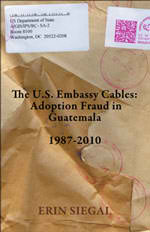As an adoptive mother to two children born in Guatemala, as well as the author of a memoir about Guatemalan adoption, I read every book, article, and blog post I can find on the subject. No single piece of writing has fascinated me more than The U.S. Embassy Cables: Adoption Fraud in Guatemala 1987-2010, by investigative reporter Erin Siegal. The publication isn’t a book in the traditional sense, but a 717-page compilation of “cables” (pre-internet communications), memos, and emails, generated by officials in the U.S. Embassy in Guatemala City and the U.S. Department of State (DOS). Siegal obtained the material from DOS after filing 30 Freedom of Information Act requests between November 2008 and 2010.
The book’s unconventional format takes some getting used to, but that’s precisely what makes it so compelling: the reader feels he is privy to something secret and private, a communication never intended to be revealed. Those readers who stick with the challenge are rewarded with a deeper understanding of one particular aspect of adoption between Guatemala and the United States—fraud–as it was reported via the keyboards of U.S. government officials.
Adoption between Guatemala and the United States was shut down in December 2007, due to allegations of corruption. The thousands of Embassy cables regarding corruption—what it entailed, how much there was, and who knew about it and when—both enlighten and disturb.
Concerns about falsified documents are stated as early as August 1987, as demonstrated by this memo generated by officials in the U.S. Embassy in Guatemala City: “[T]he ability of persons involved in child trafficking to proceed as if the adoption were completely legal is facilitated by the ease with which Guatemalan documents can be falsified.” (13) And from July 1993: “Just because the civil documents and identity cards presented are genuine, does not mean that the information contained in them is correct. Guatemalan civil documents, particularly birth certificates, containing false information are easily obtainable for a small fee.” (126)
A memo from 1989 sounded this alarm: “Attorneys who do adoptions in Guatemala receive fees that are astronomical by local standards. One adoption attorney regularly charges the adoptive parents 12,000 dollars, plus 150 dollars per month for childcare… (Most heads of family in Guatemala make less than 150 dollars per month… Judges of the family courts make about 500 dollars per month, and social workers make about 200 dollars.) The incentives for fraud are very strong…(34).”
Indeed, for some unscrupulous attorneys, the incentives were irresistible, as demonstrated by this 1991 memo: “Since we began routine interviewing of birth mothers one year ago, we have detected cases of baby selling (for very modest sums), imposter mothers, presentation of false birth certificates, children not meeting the legal definition of orphan and deception of birth mothers as to the legal consequences of adoption by local attorneys. We detect this type of obvious irregularity in about 5 percent of the cases presented.” (93)
No follow-up memo is published to interpret this data, so readers are left to wonder if “obvious irregularity in about 5 percent of the cases” is expected and normal, or considered off-the-charts. Nor do we learn if this number remains constant or changes over time. In any case, a quick mathematical calculation determines that this note was written 21 years ago, 16 years before any concerted efforts were made to reform the system.
With memo after memo detailing questionable paperwork coupled with more and more money, readers may dread turning the page, fearing the situation will turn violent. And then it does. This communication dates from September 1998: “Post was contacted by Guatemalan national, [blank], who claimed that his daughter was given up for adoption to an American couple without his knowledge and consent… Mr. [blank] was murdered shortly after he was interviewed by a consular officer regarding the case.” (377)
Even DNA tests, which the Embassy instituted on a wide scale in 1998 after repeated requests to DOS, were not failsafe. Memos state that a DNA match between relinquishing mother and her child did not discount coercion of the mother. Moreover, adoption attorneys, facilitators, and other interested parties were often present when doctors took DNA samples, nullifying the sample’s integrity.
The adoption story told by The Embassy Cables cannot be regarded as complete or balanced because the subject is too complex to be summarized by 717 pages of memos that lack interpretation, reflection, or context. Nevertheless, as a historical record of the U.S. government’s statements and actions regarding adoption as it was practiced between 1987 and 2010, The Embassy Cables makes a singular contribution.
The Embassy Cables: Adoption Fraud in Guatemala 1987-2010 is available through Amazon, Barnes and Noble, and independent bookstores. Some readers report that the downloaded version requires a magnifying glass to read. For more information, visit Erin Siegal’s website, erinsiegal.com.
This review was cross-posted at Adoption Under One Roof.
Image Credit: Cathexis Press




 ShareThis
ShareThis